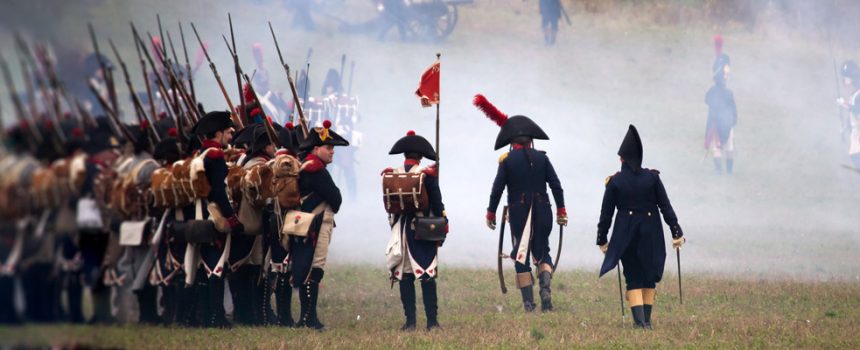While traveling through Europe this summer, and especially spending some time in France, I had the opportunity to explore the story of the great French Emperor Napoleon Bonaparte and his path of success and leadership. Without a doubt, Napoleon was not only one of the greatest European generals, but also (and most importantly) an excellent leader, someone everyone in a leadership position can learn from. (Of course, opinions differ on his methods, objectives, and outcomes but regardless we can still learn conceptually from much of it).
Napoleon can be classified as one of history’s greatest leaders and generals alongside the likes of Julius Caesar, Frederik II of Prussia, Katharina the Great, and Alexander the Great. They all had something in common: they were authentic and charismatic leaders, who were passionate about what they were doing and always had the bigger picture in mind.
Comparison to Sales
Based on the example of Napoleon’s leadership technique, I would like to take a look at sales leadership today and draw a connection between history and presence.
All sales leaders are battlefield commanders. They are challenged every day to lead their team members in the adaptation of the company’s sales strategy. The objective is to defeat the competition in terms of gaining market share and making their products attractive to potential customers.
It is not only the outcome that counts. It is the path that leads to success which is important and is measured by every step taken.
A sales manager has a profound impact on the company’s success. The quality of a sales department is directly associated with the quality of sales leadership.
Characteristics
A leadership style is often dependent on the personality and management style of the leader, but there are some characteristics that are crucial for the overall success. Today I would like to take a look at these important skills that every manager can adopt and internalize in their own system.
To return to Napoleon and to complete the circle, I will go back in history. Napoleon was born the son of a minor noble, and in a very short time gained control of France and conquered Europe. Why was he able to do this? Because he acquired skills and abilities that helped him make the right decisions at the right times, and in turn, it benefitted his own country. It was intelligent victories and a great leadership style that won him the admiration and unquestioning devotion of his army.
1. Self Improvement
Napoleon was always eager to learn and improve himself, acquiring new knowledge and skills. He was an avid reader, especially about great leaders and heroes like Julius Caesar and Alexander the Great. He read books about any country he intended to rule. Planning a military campaign did not only consist of the military strategy but also of the knowledge of the environment, culture, history, and geography. Such learning made him better prepared for unprecedented situations, enabling him to adapt and make precise moves when it was necessary.
Today a wide array of books, training, coaching and knowledge platforms are available, through which sales managers can improve their techniques and skills. Knowing more means acting faster and more confidently.
Knowing more about prospective customers and competitors makes it easier and less time-consuming to take the right steps and adopt the right techniques.
2. Command Instinct
After informing himself and building a definite strategy, Napoleon issued clear orders to his soldiers and set the path.
He made his position as a leader clear. This was not only from his standpoint as a general, but more from his role as a charismatic and authentic leader and role model who had a significant track record of victories. He gave his troops a feeling of invincibility and camaraderie. Everybody’s effort was important as a single team member and for the team as a whole.
The authority of a good sales manager is not based on autocracy, but by the way, they create an environment in which every team member constantly works to improve themselves and the overall improvement of the outcome. They lead through their own personality, skills and track record of success.
3. Rewarding
Napoleon was very keen on rewarding heroic and brave actions, particularly through the Legion of Honour, which he created and which is still retained in France today.
He instilled a spirit of competition in his army and kindled their moral fiber. Victories were recorded on regimental flags, encouraging an esprit de corps. By reinstating the rank of marshal, Napoleon procured the devotion of his main commanders.
It is crucial for a good sales leader to create a system of rewards that motivates and inspires all the team members to give their best, remain dedicated and stay focused.
It is important that each and every team member understands that they are part of something more powerful and successful than the moment they are in. The company is a community that only can succeed when everyone is highly motivated and focused on the goal.
4. Hiring ability
The ability to hire talented personnel is one of the crucial success factors of a company. Good sales managers hire salespeople who are excellent relationship builders, are skilled in handling stressful situations, have endurance, are experienced in sales techniques, are self-motivated and are able to make the company’s business their own.
Loyalty is only obtained through a leadership style that motivates, inspires and rewards success.
Napoleon’s army admired their leader and was willing to follow him through challenging times and hardships.
This is only one example in history that demonstrates how leadership doesn’t come out of a position or a birthright but from a set of skills and a craft. It is something everyone can learn and adapt, and use to forge their way to great success.










Comments